33 products

- White Wine
- Grechetto
- Organic
- Dry
- 750ml
About the Winery
Cantina Cenci
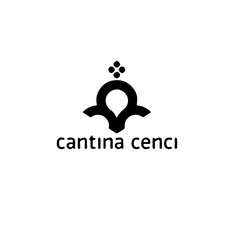
The Cenci Family has been dedicated to viticulture for over four generations, continuing to cultivate the vine with deep respect for the traditions and unique characteristics of the land once owned by the Olivetan monks. In the early 1950s, Mario—an enlightened and forward-thinking agricultural expert, and grandfather of Giovanni—selected clones of Grechetto, Sangiovese, and Malvasia from vines once cultivated by the Olivetan monks and traditionally grown intertwined with mulberry trees. He planted the first vineyards of the estate, and the wines made from those grapes were of such outstanding quality that he secured a long-term contract to supply Grechetto and Sangiovese in traditional flasks to the restaurant of a prestigious hotel in Perugia.
In 2012, following two years of renovation of the farmhouse, the new winery was inaugurated under the guidance of Mario Cenci, architect and brother of Giovanni. Thanks to cutting-edge equipment and winemaking techniques—combined with deep respect for tradition and the passionate leadership of Giovanni Cenci (viticulturist, enologist, food biotechnologist, and sommelier)—Cantina Cenci today produces wines appreciated by a niche audience of expert consumers.
The perfect balance between tradition and innovation has shaped a strong and distinctive brand identity.
- Red Wine
- Cabernet Franc
- Organic, Vegan-Friendly
- Dry
- Medium Bodied
- 750ml
- 13.50% alc./vol
About the Winery
Château de Parnay
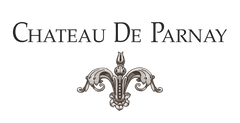
Château de Parnay is the flagship of the AOC Saumur Champigny. The property is located along the Loire river, classified as UNESCO World Heritage, on the most reputable clay and limestone terroirs of the appellation. The historic property was taken over by Mathias Levron & Régis Vincenot in 2006 with the aim of restoring the nobility of this special place.
Drawing their strength from the authenticity of their values, they now cultivate 50 hectares of vines with the aim of producing exceptional wines in a way that respects the environment. They have been certified organic since 2013 and are about to be certified biodynamic too.
The Clos of Chemin des Murs is the jewel of the property! Coming from the imagination of it's orginal owner, Antoine Cristal, this Clos was built, planted and cultivated according to an unprecedented technique. On this half hectare of Chenin Blanc, each vine was planted on the north face of a stone wall. Through a hole in the stone the vine crosses through the wall and allowing the grapes to grow facing the southern sunshine. The vine is said to have its 'foot in the cool and belly in the sun'.
Press Reviews
Wine Align
93 points - Megha Jandhyala
This is a concentrated, complex, gracefully balanced cabernet franc. Notes of ripe red plums, blackberries, dark cherries, tobacco, dried leaves, and violets are interwoven here to form an elegant, engaging, and varietally representative flavour profile. The palate is densely flavoured but lithe, with fine-grained tannins and refreshing acids. The finish is long, layered, and captivating. Though it can be enjoyed now, I would cellar this for 2-3 years. Tasted January 2024.
93 points - David Lawrason
This is a serious cab franc indeed - not so much in terms of weight and power, but in its complexity, poise and length. It’s a deeply coloured for franc. The nose shows fine, ripe raspberry, perfectly pitched by fresh herbs, tobacco and violet. It is loosely structured mid-palate, and a touch warm, with slightly green tannin. The length is excellent. I would age it a year or three. Tasted January 2024
92 points - John Szabo, MS
Silky and refined, elegant but dense, this Saumur Champigny (cabernet franc) is a substantial and serious wine, with a high degree of textbook regional character, complete with a touch of green-herbal, varietal flavour. Tannins are fine and dusty, acids gently salty, and length good to very good. I'd suggest another year or two in the cellar to further refine the texture and develop complexity - potential I think is high. Tasted January 2024.
- White Wine
- Clairette, Grenache Blanc, Marsanne, Picpoul
- Organic, Vegan-Friendly
- Dry
- Full Bodied
- 750ml
- 13.50% alc./vol
About the Winery
Château de Montfaucon

Just across the Rhone river from the beautiful vineyards of Chateauneuf-du-Pape, the Lirac appellation extends itself on the low hills alongside the river. The history of Château de Montfaucon dates back to the 11th century when the castle's first tower was built. The castle's role in history was strategic; the Rhône River was the border between the French Kingdom and the Holy Roman German Empire. Montfaucon was one of many castles and fortresses along the Rhône River constructed to guard the border.
Rodolphe de Pins took over the family estate of Montfaucon in 1995 and subsequently rebuilt the winery and began practicing sustainable agriculture. He honed his winemaking skills in Barossa at Henschke and Vieux Telegraphe in Châteauneuf du Pape before returning to Lirac, so needless to say, his familiarity with the local varieties is well established.
Press Reviews
Wine Align
92 Points - David Lawrason
This is a blend of usual suspects among the white grapes of southern France with marsanne leading at 40% followed by clairette at 35%. It was fermented and aged in French oak barrels which accounts for the quite deep yellow gold colour. The nose is rather reserved but exotic and complex with waxy notes, apricot, orange peel, honey and wood spice. It is full bodied, almost thick, creamy and warming with 13.5% abv. Quite a mouthful, with some sense of wood tannin on the finish. Needs very rich savoury dishes. Excellent length. Tasted Nov 2025
- Red Wine
- Cabernet Franc, Merlot
- Dry
- Medium Bodied
- 750ml
- 13.50% alc./vol
About the Winery
Château du Moulin Noir
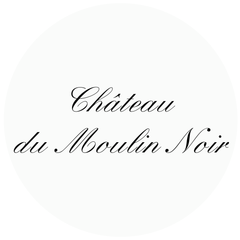
This beautiful right-bank Bordeaux estate consistently produces high-value, elegant and classic Merlot dominant wines and is considered one of the most famous Château of this appellation. Located in Montagne-Saint-Emilion, Château Moulin Noir consists of seven hectares of vineyards on clay and limestone soils.
This château owes its name to a family feuddating back to the Middle Ages. Two brothers were arguing about their father’s legacy with the youngest brother being incredibly jealous that everything went to the elder. He was so jealous that he burnt the château to the ground - Moulin Noir translates to “blackened Mill”.
- Sparkling Wine
- Chardonnay, Pinot Noir
- Sustainable, Vegan-Friendly
- Medium Bodied
- 750ml
- 12% alc./vol
About the Winery
Champagne Fresne Ducret
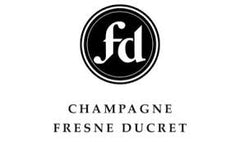
Fresne-Ducret is rich in family history and has been rooted in the premier cru village of Villedommange since the mid 1800s. Originally growing grapes for the big champagne houses, it wasn’t until the end of the second world war that the family decided to make their own wine. The tradition carries on today with Pierre Fresne and his wife Daniella (an Oakville ex-pat). Their philosophy is to produce wines that best exemplify the terroir of Villedommange, and they do this with sustainability in mind.
In 2014, Pierre Fresne embarked on a new adventure by creating a limited series of champagnes based on his desire for experimentation. Since then, he has produced one or two of these wines each year. Each are unique, according to his wishes and the profile of the vintage. This unique collection is called Arquémie, the term for alchemy in the Middle Ages. In 2018 Pierre began converting the vineyards to organic viticulture, and 2021 will be their first organic certified vintage.
Press Reviews
Wine Align
96 points - David Lawrason
This has a very intriguing, generous nose of macaroon (coconut), straw, dried apple, toast and almond/hazelnut. Also a lovely sense of sweet nut fudge. It is medium bodied with fulsome flavour, riveting acidity and all kinds of Champagne minerality. Great focus and length here. Wow! Tasted October 2020
93 points - John Szabo
Fresne Ducret's latest release of this premier cru "Chemin du Chemin champagne is a characteristically smoky and savoury, toasty and biscuity, mature champagne in the English style, balanced and savoury. I really like the developed, mature profile here, the great length. This is very good champagne ready to go. Tasted October 2020.
93 points - Michael Godel
When richness, yeasty and warm toasted brioche get together in Champagne the effect is comforting and potentially hypnotizing. From the Premier Cru village of Villedommange dating back to the mid 1800s, the pedigree is noted and the 48 months of lees aging a coup for creating both a creamy and a revitalizing Champagne. There is an oxidative aspect here and it's effectualness is one that imagines exotic spice cupboards, masala mixes and gingery tisanes. Quite the exotic bubble, lightly frothy, elegantly styled, complex and fine. Drink 2020-2026. Tasted October 2020.
Wine Enthusiast
94 points
This Champagne shows some fine maturity. A blend based on the 2014 vintage, it now has toastiness while keeping intense freshness. Acidity and touches of minerality come through the spiciness. Drink now.
- Red Wine
- Merlot
- Sustainable, Vegan-Friendly
- Dry
- Full Bodied
- 750ml
- 13.7% alc./vol
About the Winery
Leaning Post
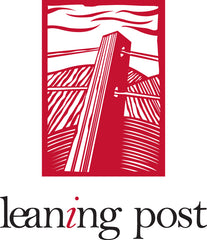
A leaning post is what you find at the beginning of a row of grapes, anchoring the wires that are the frame-work for growing grapevines. It is the beginning of an obsession to translate a time and place into liquid. Leaning Post wines take you to that beginning by finding small, unique plots of land in Niagara and putting them in bottle. Because after stripping away all the fancy buildings and high-tech equipment you are left with a place on this earth that grows wine unlike any other. When you taste that in a glass you just know it. Nadia and Ilya have had to rely on the support of family, friends and financial institutions to make the dream of owning a winery a reality. Leaning Post began as a virtual winery and is so proud to now have the quaint tasting room at 1491 Hwy 8 on their home property in Winona, Ontario.
Ilya and Nadia are the brains and passion behind Leaning Post Wines. It started with a dream to take unique, interesting single vineyard blocks in Niagara and turn them into distinctive, terroir driven wines. Nadia and Ilya first met in their hometown of Winnipeg, MB where their passion for wine and each other was born.
Ilya has been a winemaker in the Niagara Region for the last 17 vintages working at Daniel Lenko Estate Winery, Foreign Affair and now at Leaning Post Wines. Ilya is also a consulting winemaker at the Good Earth Winery. Ilya’s true passion in life is to make world renowned wines from Niagara that really showcase the distinct terroir that Niagara offers.
Press Reviews
Wines in Niagara
94 points - Rick VanSickle
The hits just keep on coming from the Bordeaux varieties which benefitted from the near-perfect growing season and long hang time in 2020. This Niagara Lakeshore Merlot is a wonder with intoxicating perfume on the nose followed by ripe raspberries and strawberries, purple plums, forest berries, floral notes and elegant spice notes. It has firm tannic structure on the palate that caresses the ripe and red and dark berries, cocoa, aniseed, fine oak spice notes on a finessed, lifted finish. A beauty that can cellar through 2024.
- Red Wine
- Pinot Noir
- Sustainable
- Dry
- Residual Sugar: 2.00 g/l
- Medium Bodied
- 750ml
- 13.00% alc./vol
About the Winery
Groupe Bellene
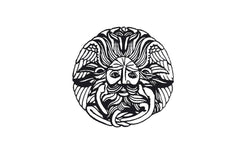
Led by Nicolas Potel in Beaune, Groupe Bellene is composed of the négociant arm Maison Roche de Bellene, the winery arm Domaine de Bellene, and a special back-vintage series under the Collection Bellenum label.
- Maison Roche de Bellene offers a complete range of wines, with an emphasis on individual terroirs from old vines of more than 40 years. All of the growers that Nicolas works with are either organic certified or sustainably farmed.
- Domaine de Bellene represents the wines that are produced and bottled from Nicolas Potel's private vineyard holdings.
- Collection Bellenum is a back vintage series that Nicolas Potel sourced from his friends in the region, offering a magnificent selection of bottled history. The wines have moved only twice in their lives, from the original cellar to Potel's and now to yours!
Nicolas Potel grew up at Volnay's Domaine Pousse d'Or, where his father worked. He trained abroad and returned home in 1996 to build a négociant business and started Maison Nicolas Potel, where he sourced grapes from good parcels, often working with the growers to improve the quality. By 2002, he was making 120 wines from 50 different appellations, and the rest is history!
Press Reviews
WineAlign
93 Points - Michael Godel
Les Quartiers De Nuits is yet another minuscule plot of a vineyard identified and chosen by Nicolas Potel, not quite one-third of a hectare, planted 96 years before this 2023 harvest. An early one for the most part, before the cold winds move in and ahead of Grand Cru neighbours like that of Echezeaux and Clos de Vougeot. There is a bit of mean intensity and streak in this singular, lieu-dit cru of a Bourgogne. The tannins are fierce, they lash upon the palate with severity and therefore the necessity to give time will become the requiem to success. Les Quartiers De Nuits is no shrinking violet and in fact the mix of botanical verdancy and bitters make up a formula which could never be solved in the first few years. The stuffing can’t be denied and the objective is perspicuous. Stay clear for a while. Drink 2028-2035.
- Red Wine
- Pinot Noir
- Sustainable
- Dry
- Residual Sugar: 2.00 g/l
- Medium Bodied
- 750ml
- 13.50% alc./vol
About the Winery
Groupe Bellene

Led by Nicolas Potel in Beaune, Groupe Bellene is composed of the négociant arm Maison Roche de Bellene, the winery arm Domaine de Bellene, and a special back-vintage series under the Collection Bellenum label.
- Maison Roche de Bellene offers a complete range of wines, with an emphasis on individual terroirs from old vines of more than 40 years. All of the growers that Nicolas works with are either organic certified or sustainably farmed.
- Domaine de Bellene represents the wines that are produced and bottled from Nicolas Potel's private vineyard holdings.
- Collection Bellenum is a back vintage series that Nicolas Potel sourced from his friends in the region, offering a magnificent selection of bottled history. The wines have moved only twice in their lives, from the original cellar to Potel's and now to yours!
Nicolas Potel grew up at Volnay's Domaine Pousse d'Or, where his father worked. He trained abroad and returned home in 1996 to build a négociant business and started Maison Nicolas Potel, where he sourced grapes from good parcels, often working with the growers to improve the quality. By 2002, he was making 120 wines from 50 different appellations, and the rest is history!
Press Reviews
WineAlign
97 Points - John Szabo, MS
Dark and brooding on the nose, reserved and still in a reductive state, this is very evidently a long way off from prime enjoyment. The palate, however, points the way forward to future harmony and integration, offering a superior dimension of flavours and saliva-inducing succulence, of energy and vibrancy. Reverberations of the earth rumble across the palate, and the body; there's clearly something special underfoot here, a tsunami of terroir, of place. The finish lingers on and on - this is special. Taste this to understand what terroir is all about, but not before 2030 for maximum revelation.
- Red Wine
- Corvina, Rondinella
- Sustainable, Vegan-Friendly
- Dry
- Full Bodied
- 750ml
- 13.50% alc./vol
About the Winery
Ca' del Monte

Ca del Monte is situated on the hillsides overlooking the village of Negrar, in the heart of Valpolicella. It has belonged to the same family for generations, and is now run by brothers Umberto and Giuseppe Zaconte. There’s nothing fancy about this place. The house and winery are modest - and are attached to a 17th century monastery.
The estate is approximately 50 acres, and its 15-65 year old vines lie on gentle slopes at 800-900 meters. They grow on four soils including clay, limestone, red volcanic soil with red stones, and “Toar,” a green volcanic soil. The vineyards of Ca Del Monte are planted with 20-40 year old vines of Corvina, Rodinella and Molinara grapes that are planted in poor soils that stress the vines and nurture the fruit. All of the farming is done traditionally and non-certified organic.
Press Reviews
Wine Align
92 points- David Lawrason
This a very agreeable, well balanced Valpolicella with classic, fresh aromas of sour cherry, rosemary, tomato leaf and spice. Also a hint of pepper. It is medium bodied, smooth and well balanced without relying too much on ripasso's baby fat to carry the day. Tannins are quite mild, some minor heat on the finish. The length is excellent. Very easy drinking but don't overlook its detail. Tasted Sept 2021
- Red Wine
- Carignan
- Sustainable
- Dry
- Residual Sugar: 2.00 g/l
- Medium Bodied
- 750ml
- 13.00% alc./vol
About the Winery
Garage Wine Co.
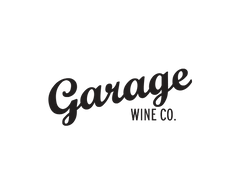
Garage Wine was literally started in a garage in 2001, by Etobicoke expat Derek Mossman and his wife Pilar Miranda. Since then, the dynamic duo handcraft wines from a series of individual vineyards located in the Maule and Itata Valleys, in the south of Santiago, Chile.
Garage Wine Co makes wines from a series of individual parcels, small lots / bottlings of 8-22 barrels that include a series of dry-farmed field-blends of Carignan, Garnacha, Monastrell, País, Cinsault and Cab Franc grown on pre-phylloxera rootstock with small farmers in the Maule and Itata. Each wine is from a 1-2 hectare parcel in a different place.
Over the years working in the community they have raised a veritable posse of vineyard hands whose skills are working the vineyards the old way / the traditional way– originario. The vineyards are on the old coastal range of mountains closer to the Pacific and have granitic soils with cracks for roots to get deep down into.
When GWCo. speaks of the provenance of these wines they mean more than just the geological terroir. Derek and Pilar think the farming practices that have evolved over generations have as much to do with the wines’ personalities as the soils. All the wines are made by hand with native yeasts in small tanks, punched down manually and pressed out in a small basket press. GWCo is still very much a DIY operation and we still tow much of the crop back to the winery in trailers behind trusty pickup trucks 2,000 kilos at a time.
Press Reviews
Vinous Media
97 Points - Joaquin Hidalgo
The 2021 Carignan Vigno originates from Empedrado in the Maule Region. Sourced from a cold area in a chilly year, it was aged for two winters in new French oak barrels. Garnet in hue, it presents nuanced, subtle aromas of pomegranate, cherry and herbs, complemented by notes of cotton candy, white pepper, earth and oak. Dry, lean and silky, with a compact and refreshing mouthfeel, this Carignan delivers a wild yet balanced palate. It stands out as a rare and expressive VIGNO, offering an unusual flavor profile that lingers long. Simply delicious.
- Red Wine
- Tempranillo
- Sustainable
- Dry
- Residual Sugar: 2.00 g/l
- Full Bodied
- 750ml
- 14.50% alc./vol
Press Reviews
James Suckling
93 Points - Zekun Shuai, Senior Editor
Fine oak spices and cocoa powder to the ripe cherries, cassis, black cherries and warm stones. Full-bodied and polished on the palate with tightly wound tannins that seep through the compact fruit. Good balance between tight structure and fruit density. From organically grown grapes. Drinkable now, but better from 2024.
- White Wine
- Sauvignon Blanc, Sauvignon Gris
- Organic, Vegan-Friendly
- Dry
- Medium Bodied
- 750ml
- 13% alc./vol
About the Winery
Réva
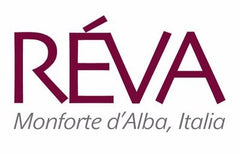
Réva is a winery based in Monforte D’Alba, within the Langhe area, in Piedmont, west northern Italy. Its aim is to bring the most brilliant young people of the area together, entrusting them with the task of expressing themselves in the most creative and professional way possible. This is Réva’s Wave, a dynamic team that represents the new Langhe generation, in constant communication with tradition, without the fear of reinterpreting it.
Today the vineyard sites which spread over 4 villages, Monforte D’Alba, Serralunga D’Alba, Novello and Barolo are all managed directly with the entire agronomic work done manually. Strong sustainable vineyards conduction, certified organic, they believe that their biggest challenge is not inventing anything but just define and express the beauty of the land where they live.
Behind every glass of wine there is an expression, expression of terroir, varietal, the varietal is for them everything, indigenous, they speak of the land and, last but not least, passion for what they do. Simply as that.
Press Reviews
Wine Align
92 points (2022) - Michael Godel
The name is Grey, representative three ways, of Réva’s Bianco label, the earth as its life giver and a sauvignon blanc meeting sauvignon gris growing from the Langhe “formation lequio.” In other words ancient Serravallian terroir come into being some 12 million years ago. Translates today as clay, limestone and fossil, adding up to and defined as grey marl. Just smells like wet stones, rich in mineral, as if after a rain. A place where ripeness means abundant and substantial fruit in cohorts with and defending the “sottosuolo” of elements below to do more than merely simulate but actually effect an authentic Langhe experience. Drink 2025-2030. Tasted May 2025
91 points (2022) - David Lawrason
This is a blend of sauvignon blanc and sauvignon gris - a highly unusual wine for the Langhe region, but a specialty of the youthfully re-imagined Reva estate in Montforte. It is an impressive, full flavoured, generous and well balanced wine with lifted aromas of guava/lychee, lemon and fresh herbs. It is very bright with lively acidity, considerable warmth and juicy, tart-edged finish. The length is excellent. A bit aggressive in the end so chill well. Tasted May 2025
91 points (2022) - John Szabo, MS
Réva's Langhe Bianco "Grey" is composed of 70% Sauvignon Gris and 30% Sauvignon Blanc, related but considered separate varieties, the former less effusively aromatic than the blanc version. It pours a pale-medium yellow gold colour, and offers maturing, bruised pineapple and binned apple aromatics in an advancing style, purposely no doubt considering Réva's commitment to natural winemaking and low intervention. It's also notably herbal, like dried mint or cold mint tea, fresh celery and other non-fruity components on a fairly rich and full-bodied frame with palpable extract - tannins - that provide some grip. Despite the advancing flavours, I'd recommend another year or two in the cellar for the palate to smooth out, and since it's not about the fruit in any case, those flavours will continue to develop in the savoury spectrum. Length is very good. Tasted May 2025.
- Red Wine
- Nebbiolo
- Organic, Vegan-Friendly
- Dry
- Medium Bodied
- 750ml
- 14.5% alc./vol
About the Winery
Réva

Réva is a winery based in Monforte D’Alba, within the Langhe area, in Piedmont, west northern Italy. Its aim is to bring the most brilliant young people of the area together, entrusting them with the task of expressing themselves in the most creative and professional way possible. This is Réva’s Wave, a dynamic team that represents the new Langhe generation, in constant communication with tradition, without the fear of reinterpreting it.
Today the vineyard sites which spread over 4 villages, Monforte D’Alba, Serralunga D’Alba, Novello and Barolo are all managed directly with the entire agronomic work done manually. Strong sustainable vineyards conduction, certified organic, they believe that their biggest challenge is not inventing anything but just define and express the beauty of the land where they live.
Behind every glass of wine there is an expression, expression of terroir, varietal, the varietal is for them everything, indigenous, they speak of the land and, last but not least, passion for what they do. Simply as that.
Press Reviews
Wine Align
93 points (2019) - Michael Godel
Nice citrus display, red and orange, into pomegranate and currants. Tart Barolo with vintage tang, idiomatic of Monforte d’Alba and solid throughout. Getting the roses and the tar, all the right moves, a vintage wine that does things with great correctness. Drink 2024-2029. Tasted blind at Nebbiolo Prima, January 2023.
93 points (2019) - John Szabo, MS
Clean, on the closed, gently reductive side; resinous herbs, minerals lead. Full, fleshy, concentrated palate, abundant but fine tannins, very good length. Quality wine, best from 2028. Tasted January 2023.
- Red Wine
- Pinot Noir
- Sustainable
- Dry
- Medium Bodied
- 750ml
About the Winery
Cordero San Giorgio
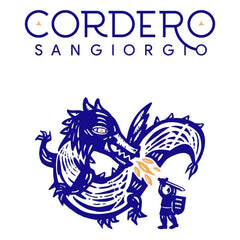
Cordero San Giorgio is a new beginning in Oltrépo-Pavese for three siblings who grew up surrounded by their family’s vines at the legendary Vietti Estate in Castiglione Falletto in Barolo. The siblings Francesco, Lorenzo, and Caterina Cordero, are grandchildren of Luciana Vietti & Alfredo Currado, one of the pioneers of the first Barolo crus and considered the “father of Arneis.” Their father is Mario Cordero, Alfredo and Luciana’s son-in-law, who was the company’s co-owner from the beginning of the ‘80s until 2016 when it was sold.
Cordero San Giorgio is located in Santa Giuletta, a village sitting on the first hilly belt of the territory, an area made up of valleys that fan out over the Po Valley with steep slopes and thick ridges. The composition of the soil makes their site particularly suitable for the production of Pinot Nero, making it possible to obtain wines with maximum varietal expression and a strong territorial identity.
The Oltrepò Pavese is a hilly triangle of land in Lombardy, embraced by Piedmont, Liguria, and Emilia-Romagna. A territory dedicated to the cultivation of vines and the culture of wine for centuries: a land of both cultural and gastronomic encounter and exchange. Cordero San Giorgio is in the town of Santa Giuletta, and focuses on working with Pinot Nero, Pinot Grigio and Chardonnay.
- White Wine
- Chardonnay
- Sustainable
- Dry
- Medium Bodied
- 750ml
About the Winery
Cordero San Giorgio

Cordero San Giorgio is a new beginning in Oltrépo-Pavese for three siblings who grew up surrounded by their family’s vines at the legendary Vietti Estate in Castiglione Falletto in Barolo. The siblings Francesco, Lorenzo, and Caterina Cordero, are grandchildren of Luciana Vietti & Alfredo Currado, one of the pioneers of the first Barolo crus and considered the “father of Arneis.” Their father is Mario Cordero, Alfredo and Luciana’s son-in-law, who was the company’s co-owner from the beginning of the ‘80s until 2016 when it was sold.
Cordero San Giorgio is located in Santa Giuletta, a village sitting on the first hilly belt of the territory, an area made up of valleys that fan out over the Po Valley with steep slopes and thick ridges. The composition of the soil makes their site particularly suitable for the production of Pinot Nero, making it possible to obtain wines with maximum varietal expression and a strong territorial identity.
The Oltrepò Pavese is a hilly triangle of land in Lombardy, embraced by Piedmont, Liguria, and Emilia-Romagna. A territory dedicated to the cultivation of vines and the culture of wine for centuries: a land of both cultural and gastronomic encounter and exchange. Cordero San Giorgio is in the town of Santa Giuletta, and focuses on working with Pinot Nero, Pinot Grigio and Chardonnay.
- Red Wine
- Nebbiolo
- Sustainable
- Dry
- Residual Sugar: 2.00 g/l
- Full Bodied
- 750ml
- 14.00% alc./vol
Press Reviews
Vinous Media
96 Points - Antonio Galloni
The 2010 Barolo Riserva Bussia from Pianpolvere Soprano is a flat out stunner. It is also the first Barolo I've tasted under Rocche dei Manzoni's stuartship of this historic Monforte estate that takes me back to the wines of Ferruccio Fenocchio prior to his passing. Rose petal, mint, kirsh, spice and blood orange are some of the many notes that shape this exquisite, classically translucent Barolo. Medium in body and supremely refined, the 2010 is utterly beguiling. I can't wait to taste it with bottle age.
- Red Wine
- Sangiovese
- Dry
- Residual Sugar: 2.00 g/l
- Full Bodied
- 750ml
- 14.50% alc./vol
About the Winery
Cortonesi

“I’m a lucky man who has been given the opportunity to realize my dream and continue my family’s efforts making wine in the land where I was born.” – Tommaso Cortonesi
Tommaso is third-generation winemaker at Cortonesi that owns some of the most prized vineyards in the north and south-east of Montalcino. Favourable geography, rocky soils, and ingenious winemaking all come together to create some of the region's deepest and most elegant Brunello wines.
The Cortonesi family has been making wine since the 1970s. At first, wines were made to be enjoyed by family, friends and neighbours, but then in 1985, Cortonesi had gained enough traction within their community that they began to offer their wines commercially. Today, Cortonesi remains a family business that continues to work according to tradition, while employing modern technologies to the enhance the quality of their production.
Lovers of Sangiovese must experience “La Mannella”, a collection of wines exclusively sourced from Cortonesi's private vine land. This farm covers 56 hectares, eight of which are devoted to the production of some of the world's most coveted and age-worthy Brunello di Montalcino.
Press Reviews
Gardini Notes: Brunello di Montalcino 2020 Report
97+ Points - Luca Gardini
The ideal complement, for expressiveness and varietal coluoring, of the laudable work developed in parallel on the cru de La Mannella. Smell with hints of red mulberry, nuances of nutmeg and sensations of gardenia and marjoram. The sip is iodate-salty, with small fruit hints.
- Red Wine
- Sangiovese
- Sustainable
- Dry
- Residual Sugar: 3.00 g/l
- Full Bodied
- 750ml
- 14.50% alc./vol
About the Winery
Cortonesi

“I’m a lucky man who has been given the opportunity to realize my dream and continue my family’s efforts making wine in the land where I was born.” – Tommaso Cortonesi
Tommaso is third-generation winemaker at Cortonesi that owns some of the most prized vineyards in the north and south-east of Montalcino. Favourable geography, rocky soils, and ingenious winemaking all come together to create some of the region's deepest and most elegant Brunello wines.
The Cortonesi family has been making wine since the 1970s. At first, wines were made to be enjoyed by family, friends and neighbours, but then in 1985, Cortonesi had gained enough traction within their community that they began to offer their wines commercially. Today, Cortonesi remains a family business that continues to work according to tradition, while employing modern technologies to the enhance the quality of their production.
Lovers of Sangiovese must experience “La Mannella”, a collection of wines exclusively sourced from Cortonesi's private vine land. This farm covers 56 hectares, eight of which are devoted to the production of some of the world's most coveted and age-worthy Brunello di Montalcino.
Press Reviews
Gardini Notes: Brunello di Montalcino 2020
95+ Points - Luca Gardini
From the historic estate, a Brunello with a classic plant and great olfactory impact: black mulberry on the nose, touches of clementine peel, then cinnamon, to the salty palate, with a finish on notes of small fruits and sweet spices. Persistent.
- Red Wine, White Wine
- Chardonnay, Pinot Noir
- Sustainable
- Dry
- Medium Bodied
- 750ml
About the Winery
Cordero San Giorgio

Cordero San Giorgio is a new beginning in Oltrépo-Pavese for three siblings who grew up surrounded by their family’s vines at the legendary Vietti Estate in Castiglione Falletto in Barolo. The siblings Francesco, Lorenzo, and Caterina Cordero, are grandchildren of Luciana Vietti & Alfredo Currado, one of the pioneers of the first Barolo crus and considered the “father of Arneis.” Their father is Mario Cordero, Alfredo and Luciana’s son-in-law, who was the company’s co-owner from the beginning of the ‘80s until 2016 when it was sold.
Cordero San Giorgio is located in Santa Giuletta, a village sitting on the first hilly belt of the territory, an area made up of valleys that fan out over the Po Valley with steep slopes and thick ridges. The composition of the soil makes their site particularly suitable for the production of Pinot Nero, making it possible to obtain wines with maximum varietal expression and a strong territorial identity.
The Oltrepò Pavese is a hilly triangle of land in Lombardy, embraced by Piedmont, Liguria, and Emilia-Romagna. A territory dedicated to the cultivation of vines and the culture of wine for centuries: a land of both cultural and gastronomic encounter and exchange. Cordero San Giorgio is in the town of Santa Giuletta, and focuses on working with Pinot Nero, Pinot Grigio and Chardonnay.
- Red Wine
- Nebbiolo
- Biodynamic, Natural, Organic
- Dry
- Full Bodied
- 750ml
- 13.5% alc./vol
About the Winery
Punset

While the vineyards that form Punset have been farmed by the Marcarino family for generations, it is truly thanks to Marina and her incredible energy that the estate is how it is nowadays. In the 1980s, she decided to pursue organic farming – a demanding choice that was rewarded by becoming the first estate to receive the organic certification in Italy. Her passion for the soil and the environment led her to embrace biodynamics and the agronomic philosophy of Manasobu Fukuoka. From one of the healthiest vineyards in Italy, Marina crafts wines that brim with life, energy, and pure terroir.
Known for the very first certified organic Barbaresco of Italy, Marina continues to show the world that you can preserve tradition and think of the future simultaneously.
Press Reviews
Decanter
90 points
As well as a Riserva from Basarin, Punset produce one from a 1ha parcel in the San Cristoforo cru, called Campo Quadro. The two wines are styled differently, the Basarin being aged traditionally whereas the Campo Quadro matures in both barriques and tonneaux. There are assertive smoky cherry aromas on the nose, while the palate is dense, weighty and somewhat extracted. There is balancing acidity to lift the finish, but at present it lacks finesse. Drinking Window 2021 - 2036.
- Red Wine
- Corvina, Rondinella
- Sustainable, Vegan-Friendly
- Dry
- Full Bodied
- 750ml
- 15.5% alc./vol
About the Winery
Ca' del Monte

Ca del Monte is situated on the hillsides overlooking the village of Negrar, in the heart of Valpolicella. It has belonged to the same family for generations, and is now run by brothers Umberto and Giuseppe Zaconte. There’s nothing fancy about this place. The house and winery are modest - and are attached to a 17th century monastery.
The estate is approximately 50 acres, and its 15-65 year old vines lie on gentle slopes at 800-900 meters. They grow on four soils including clay, limestone, red volcanic soil with red stones, and “Toar,” a green volcanic soil. The vineyards of Ca Del Monte are planted with 20-40 year old vines of Corvina, Rodinella and Molinara grapes that are planted in poor soils that stress the vines and nurture the fruit. All of the farming is done traditionally and non-certified organic.
- Red Wine
- Carignan
- Sustainable
- Dry
- Full Bodied
- 750ml
- 14.8% alc./vol
About the Winery
Bodegas Puiggros
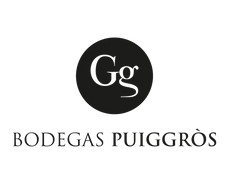
Since 1843, the Puiggros family has been producing wines from their own vines in the Odena region of Catalunya for the family and close friends. Over generations they had come to realize that their vineyards and techniques were something worth sharing with the world. A sincere dedication to the terroir in their zone and the indigenous varieties that grow there, allows them to constantly discover ways to unlock all of the magic that lies within their land.
Starting with conscious and clean farming in the vineyard, they hand-harvest only the best fruit for their production, and ferment each vineyard separately in varying vessels to accentuate what the vines have to show; some in stainless steel, and many in clay amphora of differing sizes. All the while seeing very little sulfur use (if any) until bottling. Puiggros is pushing the quality of northeastern Spain's wines forward, and doing so in a clean and unique way.
Bodegas Puiggròs
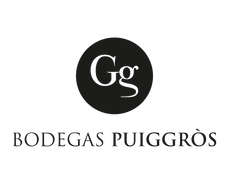
Since 1843, the Puiggros family has been producing wines from their own vines in the Odena region of Catalunya for the family and close friends. Over generations they had come to realize that their vineyards and techniques were something worth sharing with the world. A sincere dedication to the terroir in their zone and the indigenous varieties that grow there, allows them to constantly discover ways to unlock all of the magic that lies within their land.
Starting with conscious and clean farming in the vineyard, they hand-harvest only the best fruit for their production, and ferment each vineyard separately in varying vessels to accentuate what the vines have to show; some in stainless steel, and many in clay amphora of differing sizes. All the while seeing very little sulfur use (if any) until bottling. Puiggros is pushing the quality of northeastern Spain's wines forward, and doing so in a clean and unique way.
Press Reviews
Wine Align
94 points - David Lawrason
This is a quite lovely, refined and intriguing Priorat - not as 'heavy' and powerful as some but so nicely expressing the carinyena (carignan) grape. Expect lifted aromas of pomegranate/raspberry with florals, fresh herbs, earth and mineral notes all finely integrated. It is medium-full bodied, lively and almost juicy with carignan's natural energy at work. Tannins are dry and dusty but not green. The length is excellent to outstanding. Will age another ten years but approachable now. Tasted May 2025
93 points - Michael Godel
The work of Bodegas Puiggrós happens in Catalunya and also here in Priorat where the soils are predominantly slate, known locally as “llicorella,” and the significance on the wines, inclusive of this varietal carinyena should not be overlooked. Or taken for granted because the tightly wound, focused and intensity of ultra specific mineral feels are what drive the regional machine. A serious and giving wine from a promising vintage yet here in its infancy and surely structured to be three years away from optimum potential. Drink 2027-2032. Tasted May 2025.
93 points - John Szabo, MS
This is the first vintage of this wine from Priorat produced by Bodegas Puiggròs, made of pure carinyena (carignan) form the region's steep, slate vineyards, and aged in amphora I'm led to believe, though no details can be found on the winery website. It certainly smells like a terra cotta-aged wine with its wet concrete and clay aromas, alongside lavender and rosemary, wildly resinous; fruit is very much a side show in this exotic and original example. It enters fluidly and sleekly before dusty tannins kick up; acids are balanced. It's quite tight and linear overall despite 15% alcohol declared, a far cry from the broad, base note-heavy style more typical of the region. It's an utterly new paradigm for Priorat, at least in my experience - I'd like to spend more time with it to see how the story unfolds, and watch it over several years in the cellar. I keep coming back for more. Tasted May 2025.
91 points - Sara d'Amato
This carignan-based Priorat is full-bodied and warm but well-crafted with an undercurrent of minerality and lightly salty freshness. Showing some evolution in colour and fruit with ample natural spice and hints of iron. Drinking very well now with good depth of flavour and significant length. Tasted May 2025.
- Red Wine
- Nebbiolo
- Organic, Vegan-Friendly
- Dry
- 750ml
- 14% alc./vol
About the Winery
Réva

Réva is a winery based in Monforte D’Alba, within the Langhe area, in Piedmont, west northern Italy. Its aim is to bring the most brilliant young people of the area together, entrusting them with the task of expressing themselves in the most creative and professional way possible. This is Réva’s Wave, a dynamic team that represents the new Langhe generation, in constant communication with tradition, without the fear of reinterpreting it.
Today the vineyard sites which spread over 4 villages, Monforte D’Alba, Serralunga D’Alba, Novello and Barolo are all managed directly with the entire agronomic work done manually. Strong sustainable vineyards conduction, certified organic, they believe that their biggest challenge is not inventing anything but just define and express the beauty of the land where they live.
Behind every glass of wine there is an expression, expression of terroir, varietal, the varietal is for them everything, indigenous, they speak of the land and, last but not least, passion for what they do. Simply as that.
Press Reviews
Wine Align
92 points - Michael Godel
Not just amazing but actual, verifiable and absolute truth spoken by way of transparent and clemently honest nebbiolo. Reddest of the cherry red varietal wines, not Barolo because it’s almost too perfectly what it purports to be, without aggression, grip or grandeur. If anyone should find austerity in the tannins or any part of this nebbiolo then something is amiss. For pure drinking pleasure with the grape’s natural acidity in full tact and attack, look no further than this rosy beauty by Réva. Drink 2022-2025. Tasted May 2022.
- Red Wine
- Nerello Cappuccio, Nerello Mascalese
- Sustainable, Volcanic
- Dry
- Residual Sugar: 2.00 g/l
- Full Bodied
- 750ml
- 13.50% alc./vol
About the Winery
Azienda Agricola Tornatore
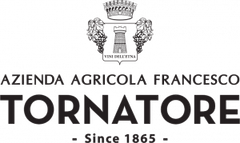
Out of a Sicilian family heritage that traces back to the 17th century, the Tornatore’s Mount Etna wine ventures began in 1865. Today the family’s operations are headed by Giuseppe Tornatore, a businessman whose expertise led to the acquisition of some of the region’s finest north-facing vineyards in the early 2000’s. That heritage and the Tornatore’s profound respect and understanding of the land is showcased in wines that capture the essence of Etna, deftly balancing concentrated flavors, complexity, freshness and refinement.
The company lies in the northern side of Mount Etna, the highest active volcano in Europe. The soils have volcanic origin and were created through the disintegration of lava, ash and stones from previous volcanic eruptions. The climate on the northern side of the Etna is characterized by mild temperatures, and more rain fall reflecting the influence of the Volcano. The combination of soil, climate and the skill of the winemakers, have made the northern slope of Etna an ideal area for the production of high-quality wines. “Our vineyards and our winery are only a few kilometers from our family home. Our entire family is rooted there. We have the greatest respect for this region, and we believe we have a responsibility to be stewards of Etna and to reflect its distinct character in our wines.” - Giuseppe Tornatore
Press Reviews
James Suckling
96 points
A perfumed nose with grapefruit, brambleberries, stones, herbs, savory spices and dried flowers. Medium- to full-bodied with silty tannins. It’s harmonious and textured with bright acidity. Pristine and transparent with a succulent core of berries at the center and vibrant energy throughout. Mineral and authentic. Precise finish with excellent length. Drink or hold.
- Red Wine
- Pinot Noir
- Sustainable
- Dry
- Residual Sugar: 2.00 g/l
- Medium Bodied
- 750ml
- 13.50% alc./vol
About the Winery
Groupe Bellene

Led by Nicolas Potel in Beaune, Groupe Bellene is composed of the négociant arm Maison Roche de Bellene, the winery arm Domaine de Bellene, and a special back-vintage series under the Collection Bellenum label.
- Maison Roche de Bellene offers a complete range of wines, with an emphasis on individual terroirs from old vines of more than 40 years. All of the growers that Nicolas works with are either organic certified or sustainably farmed.
- Domaine de Bellene represents the wines that are produced and bottled from Nicolas Potel's private vineyard holdings.
- Collection Bellenum is a back vintage series that Nicolas Potel sourced from his friends in the region, offering a magnificent selection of bottled history. The wines have moved only twice in their lives, from the original cellar to Potel's and now to yours!
Nicolas Potel grew up at Volnay's Domaine Pousse d'Or, where his father worked. He trained abroad and returned home in 1996 to build a négociant business and started Maison Nicolas Potel, where he sourced grapes from good parcels, often working with the growers to improve the quality. By 2002, he was making 120 wines from 50 different appellations, and the rest is history!
Press Reviews
WineAlign
94 Points - Sara d'Amato
A generous expression of village level Beaune from the Blanches Fleurs lieu-dit located at the northern border of Beaune close to Savigny les Beaune. Featuring a great deal of power and finesse, this lightly smoky pinot noir is bursting at the seams with black cherry, pomegranate and sweet red pepper. Pink peppercorn and rare meat play a supporting role in the flavour make-up of this engrossing and youthful pinot noir. Notes of rosebud coyly linger on the finish of excellent length. Best 2022-2025. Tasted May 2021.
- White Wine
- Chardonnay
- Sustainable
- Dry
- Residual Sugar: 2.00 g/l
- Medium Bodied
- 750ml
- 13.00% alc./vol
About the Winery
Groupe Bellene

Led by Nicolas Potel in Beaune, Groupe Bellene is composed of the négociant arm Maison Roche de Bellene, the winery arm Domaine de Bellene, and a special back-vintage series under the Collection Bellenum label.
- Maison Roche de Bellene offers a complete range of wines, with an emphasis on individual terroirs from old vines of more than 40 years. All of the growers that Nicolas works with are either organic certified or sustainably farmed.
- Domaine de Bellene represents the wines that are produced and bottled from Nicolas Potel's private vineyard holdings.
- Collection Bellenum is a back vintage series that Nicolas Potel sourced from his friends in the region, offering a magnificent selection of bottled history. The wines have moved only twice in their lives, from the original cellar to Potel's and now to yours!
Nicolas Potel grew up at Volnay's Domaine Pousse d'Or, where his father worked. He trained abroad and returned home in 1996 to build a négociant business and started Maison Nicolas Potel, where he sourced grapes from good parcels, often working with the growers to improve the quality. By 2002, he was making 120 wines from 50 different appellations, and the rest is history!
Press Reviews
WineAlign
91 Points - David Lawrason
This has a very lifted, toasty, hazelnut nose with considerable oak spice, peanut/almond skin. A bit garlicky as well, but the banana and lemon custard aromas are classic. It is full bodied, warm gritty and powerful. Very stony finish. Almost austere, and tannic. Could age very well indeed.
WineAlign
91 Points - Michael Godel
Not quite 20 year-old chardonnay vines at this stage from just a shade under 0.4 hectares below Les Charmes in Santenay. Yet another white Bourgogne stunner from Nicolas Potel that rings the bell of excellence for vintage and place. The refrain is sung on repeat because it does not seem to matter which plot, big or small - they all succeed out of the most justly cultured vintage. There is a chewy character to this Santenay and without the same bite and structural backbone of Saint-Romain, Savigny-Les-Beaune and Les Monts De Boncourt. Still the pleasure is all ours. Drink 2024-2027
- White Wine
- Chardonnay
- Sustainable
- Dry
- Residual Sugar: 2.00 g/l
- Medium Bodied
- 750ml
- 13.00% alc./vol
About the Winery
Groupe Bellene

Led by Nicolas Potel in Beaune, Groupe Bellene is composed of the négociant arm Maison Roche de Bellene, the winery arm Domaine de Bellene, and a special back-vintage series under the Collection Bellenum label.
- Maison Roche de Bellene offers a complete range of wines, with an emphasis on individual terroirs from old vines of more than 40 years. All of the growers that Nicolas works with are either organic certified or sustainably farmed.
- Domaine de Bellene represents the wines that are produced and bottled from Nicolas Potel's private vineyard holdings.
- Collection Bellenum is a back vintage series that Nicolas Potel sourced from his friends in the region, offering a magnificent selection of bottled history. The wines have moved only twice in their lives, from the original cellar to Potel's and now to yours!
Nicolas Potel grew up at Volnay's Domaine Pousse d'Or, where his father worked. He trained abroad and returned home in 1996 to build a négociant business and started Maison Nicolas Potel, where he sourced grapes from good parcels, often working with the growers to improve the quality. By 2002, he was making 120 wines from 50 different appellations, and the rest is history!
Press Reviews
WineAlign
95 Points - David Lawrason
From one more well known 1er cru sites in Beaune, this is a lovely, ripe, creamy and almost voluptuous chardonnay showing the warmth of the vintage. Expect complex and intriguing aromas of hazelnut, Boston cream pie, tarragon and toast and barrel spice. It is medium-full bodied, creamy, smooth, warm and powerful. Rich and seamless and refined, with a strong mineral seam running through the finish. The length is outstanding.
WineAlign
95 Points - Michael Godel
Historically a pinot noir plot in Beaune but Nicolas Potel made the decision in 2013 to go at it with chardonnay. Foresight is often better than hindsight and so his visionary 20-20 has gifted the world the beauty of fruit and stone intertwined from one of Bourgogne's increasingly important white sites. Vines just nine years old at this vintage and yet as experienced as those three to five times their age. A vintage like 2022 is ripe and less marginalized for chardonnay than for the pinot noir which means everything will shine and at the Premier Cru level there can be sheer greatness. Ripe grapes will have this effect and with chardonnay the excellence happens seemingly everywhere, from small plots to bigger and broader vineyards. This is a tiny one, just 0.2242 hectares and its play between fruit and acidity, extract and tannin is exceptional. The finishing bitters are an exquisite touch to an already blessed chardonnay. Drink 2025-2034.
- Red Wine
- Pinot Noir
- Sustainable
- Dry
- Residual Sugar: 3.00 g/l
- Medium Bodied
- 750ml
- 13.00% alc./vol
About the Winery
Groupe Bellene

Led by Nicolas Potel in Beaune, Groupe Bellene is composed of the négociant arm Maison Roche de Bellene, the winery arm Domaine de Bellene, and a special back-vintage series under the Collection Bellenum label.
- Maison Roche de Bellene offers a complete range of wines, with an emphasis on individual terroirs from old vines of more than 40 years. All of the growers that Nicolas works with are either organic certified or sustainably farmed.
- Domaine de Bellene represents the wines that are produced and bottled from Nicolas Potel's private vineyard holdings.
- Collection Bellenum is a back vintage series that Nicolas Potel sourced from his friends in the region, offering a magnificent selection of bottled history. The wines have moved only twice in their lives, from the original cellar to Potel's and now to yours!
Nicolas Potel grew up at Volnay's Domaine Pousse d'Or, where his father worked. He trained abroad and returned home in 1996 to build a négociant business and started Maison Nicolas Potel, where he sourced grapes from good parcels, often working with the growers to improve the quality. By 2002, he was making 120 wines from 50 different appellations, and the rest is history!
Press Reviews
WineAlign
92 Points - John Szabo, MS
A very pretty and refined Savigny old vines from domaine vines, always a solid bottling from Nicolas Potel, and attractively priced. 2022 was a warm vintage to be sure, but there's impressive balance and poise here, a purity of cherry fruit, a suppleness of tannins and comfort of the acids that beguiles. Length and depth are very good, and it's drinking remarkably well even at this early stage - it won't be a vintage for the long term I feel, but there will be considerable pleasure up front.




























